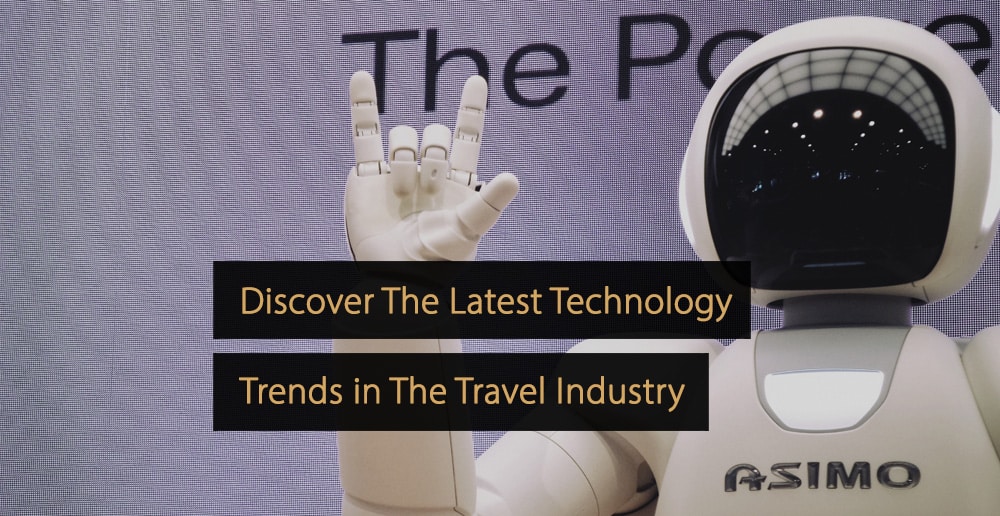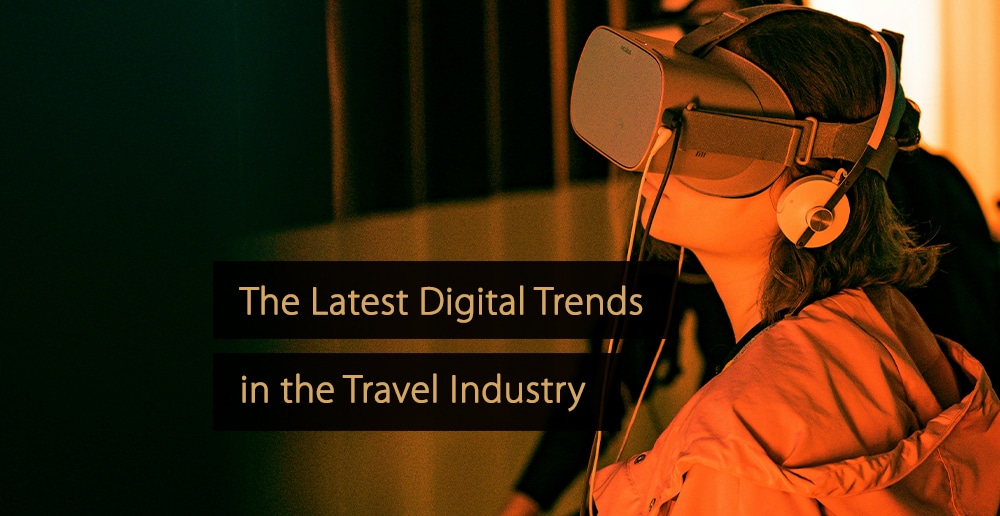Voice search within the travel industry is one of the emerging trends that marketers, business owners, and other senior figures within businesses in this area need to become aware of. In this article, you will find information about voice search technology, a list of the key benefits, and some tips for adopting an effective voice search strategy.
Table of Contents:
- What is Voice Search?
- How Do Voice Search and Text Search Differ?
- What is the Relationship Between Voice Search and Virtual Assistants?
- Why Companies in The Tourism & Travel Industry Should Embrace Voice Search
- How Does Voice Search Technology Work?
- What Are The Benefits of Voice Search for Travel Companies?
- Advice for The Tourism & Travel Industry to Improve Voice Search Strategies
- Voice Search in Action Within the Tourism & Travel Industry
- Voice Search and Other Trends in the Travel & Tourism Industry
- Voice Search and Other Travel Marketing Trends
What is Voice Search?
Voice search, sometimes referred to as voice-controlled search or voice-enabled search, is a process where a user can conduct a search of the world wide web, a specific website, or an application through the use of voice commands. It is often associated with virtual assistants, but this is not always true.
Essentially, the voice commands the user gives to replace the text inputs associated with more traditional searches. It uses voice recognition technology, which understands human speech and converts it into a search query. This can be especially useful on devices where typing is impossible or for people who find typing difficult.
Today, voice search in travel can be used on various devices, including smartphones, computers, smart speakers, smartwatches, and smart TVs. Results may be in text format or may be read aloud using text-to-speech.
How Do Voice Search and Text Search Differ?
The main way in which voice search and text search differ is through the requirement of different actions from the user. With text search, a user must generally type their search query into a search box and press ‘Enter‘ or click on a ‘Search‘ button, whereas voice search allows the search query to be spoken instead.
This voice-controlled approach can offer advantages. Voice search for travel customers is generally quicker than typing and can be carried out while performing other activities, offering convenience. However, depending on the device used, there may be fewer options for exploring the search results, and sometimes the voice recognition may make errors.
What is the Relationship Between Voice Search and Virtual Assistants?
The concept of voice search and the emergence of virtual assistants has led to situations where the two terms are sometimes used interchangeably, but in reality, they describe different things. Voice search refers to any technology that allows users to search using voice commands to enter their question, query, or search string.
While virtual assistants usually offer voice search, they also offer a range of additional features. For instance, many virtual assistants can sync information to calendars and perform additional tasks besides searches. The range of features available varies depending on the virtual assistant and the device used.
However, virtual assistants and voice search are relevant to the travel and tourism industry.
Why Companies in The Tourism & Travel Industry Should Embrace Voice Search
The biggest reason businesses in the travel and tourism industry must embrace voice search is that travel customers already have. Smart devices offering virtual assistants like Alexa, Siri and Google Assistant have been widely adopted, while the Digital Marketing Institute estimates that 30 percent of all browsing is screenless.
Investing from major companies like Amazon, Google, Microsoft, and Apple in voice recognition technology and voice search capabilities has helped improve the results massively. The aforementioned Digital Marketing Institute article also highlights that Google has improved its voice recognition accuracy to above 90 percent.
This has had a knock-on effect on consumer behavior, with more people utilizing the technology as it has become more dependable. DBS Interactive claims 41 percent of adults now use voice search at least once per day, and more than half of all smartphone users engage with voice search technology to some degree.
This means voice search in travel and tourism is here to stay. The companies that fail to embrace the technology only limit their reach by neglecting a significant demographic of regular voice search users. Today, voice search is regularly used to find and book hotels, flights, meals, package holidays, etc.
How Does Voice Search Technology Work?
Voice search makes use of several different technologies. The user’s voice command is understood through a technology called automatic voice recognition, which can understand the words being said and convert them to a format that allows a search to be carried out. In some cases, it can even detect a variety of different languages.
When a search result is read out to the user, this is achieved using text-to-speech technology. The search is carried out using a search engine like Google or Bing. In some cases, users can add extra voice commands to narrow results down, which is achieved through artificial intelligence.
What Are The Benefits of Voice Search for Travel Companies?
Several plus points or advantages are associated with embracing voice search in the travel industry. This section will teach you three of the most significant benefits.
1. Enhance the Customer Experience
For those involved with travel management, the customer experience has to be a top priority because it is the basis upon which many people ultimately make their decisions. Embracing voice search in travel can enhance the customer experience by providing greater convenience for customers making bookings.
Naturally, much of the focus with voice search in travel is on the discovery phase, but many companies could benefit from providing voice search options when customers arrive too. For example, voice search may be used within hotel rooms, through smart speakers to allow customers to find important information about the local area.
2. Generate More Website Hits
Another big incentive for travel companies to focus more on voice search is the ability to boost website traffic. The reality is that some users now predominantly use voice search, especially if they habitually turn to virtual assistants on their smartphones or smart speakers.
Optimizing web content with voice search in mind can be one of the only ways to reach out and attract these people to your website or get them to engage with your booking engine, so it is important to make an effort to do so.
3. Stay Ahead of Competitors
The other major reason you should adopt a voice search strategy in the travel industry is that some other businesses have been slow on the uptake. This means you can gain a competitive advantage over rival hotels, airlines, restaurants, and more.
This is especially true if you can devise innovative ways to capitalize on the technology, such as allowing customers to use voice search while they are on your premises.
Advice for The Tourism & Travel Industry to Improve Voice Search Strategies
Once you accept that voice search is one of the emerging travel trends, it is sensible to take the right steps to create an effective voice search strategy. Here, you can find four tips.
Optimize Content for Local Search
A significant amount of voice search activity is carried out by people physically present in the local area, who want to know more about a nearby business. With this in mind, you need to optimize your online content for local search. This means referring to your physical location on your website, making sure business directories are up-to-date and standardized across all platforms, and providing a contact phone number.
Think About Your Specific Customers
It is important that your voice search strategy is not too general and is instead focused on your own specific customers. Consider what they are likely to search for and optimize your content with these ideas in mind. You want to rank highly for search terms relevant to your business, as there is no real benefit in ranking highly for search engine users who have an intent unrelated to your business or what you have to sell.
Consider How Voice Search is Used
Next, you need to consider how voice search is used and, in particular, how it differs from text searches. One example is that voice search users tend to ask questions or make quite detailed requests, whereas text search users may enter a few keywords in a less structured way. Using longer voice search strings also allows you to research some longer keyword phrases to focus your SEO efforts on.
Optimize With Search Engines in Mind
Finally, while voice search in the travel industry is still emerging as a trend, you must understand that it is still reliant on search engine technology. With this in mind, your content still needs to be optimized for Google and Bing. Use keywords, provide additional information through Schema markup and structure content in ways that search engines can easily read, such as headings, sub-headings, and bullet points.
Voice Search in Action Within the Tourism & Travel Industry
When adopting new travel trends, seeing them in action can sometimes be useful. Below, you will find two videos demonstrating precisely how travelers can use voice search.
Book Your Holiday with Voice Search
A good example of voice search in action within the travel industry is this video, which focused on the Expedia skill for Amazon Alexa. This provides a voice-activated means of managing your upcoming travel and booking holidays.
Video: Expedia Skill for Amazon Alexa
Find & Book a Hotel with Voice Search
The video below demonstrates how a traveler might use voice search to find a hotel online. The user can specify the features the hotel should have and is then presented with a list of options and the ability to make a booking.
Video: Hotel Search on Smartphone with Voice
Voice Search and Other Trends in the Travel & Tourism Industry
While voice search is an important trend within travel, there are several additional travel and tourism trends you need to be aware of and stay on top of too. These include virtual reality, the use of robotics, the deployment of AI chatbots, facial recognition technology, and more.
Read “Key Technology Trends Emerging in the Travel & Tourism Industry” for a more in-depth look at the major technology trends and information on how they can benefit your travel or tourism business.
Voice Search and Other Travel Marketing Trends
Marketing is one of the biggest reasons to adopt a voice search strategy. Still, there are several additional travel marketing trends that you should ensure you are familiar with. Examples of this range from personalization and customer experience marketing to virtual reality and content marketing.
Check out “Travel Marketing: The Latest Travel Marketing Tips to Optimize Your Results” to learn more about these major trends and how they can assist you with your marketing efforts.
Voice search within the travel and tourism industry has become an essential area of focus for businesses because customer behavior is changing, and more people are embracing technology. For this reason, businesses in the industry must optimize content and adapt their SEO strategy with voice search in mind.
More Tips to Grow Your Business
Revfine.com is the leading knowledge platform for the hospitality and travel industry. Professionals use our insights, strategies, and actionable tips to get inspired, optimize revenue, innovate processes, and improve customer experience.Explore expert advice on management, marketing, revenue management, operations, software, and technology in our dedicated Hotel, Hospitality, and Travel & Tourism categories.








Excellent post with a wealth of information on how to optimise your voice search results. Voice search optimization strategies are an excellent and easy way to communicate information. This post has addressed all of my worries and provided answers to all of my questions.
Thank you for this post. Very useful and easy to understand. VSO is an important part of modern digital marketing these days.